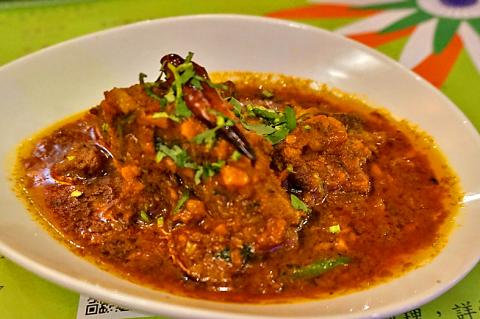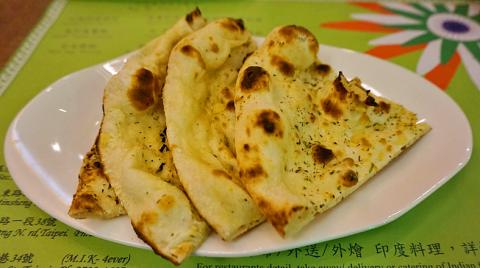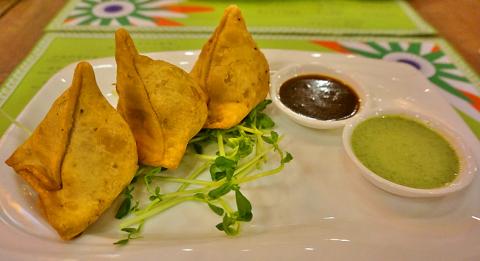Mayur Indian Kitchen tries to be a bit of everything — North Indian and South Indian cuisine, vegetarian and non-vegetarian, halal and non-halal. They have four branches, each with a different menu and concept ranging from buffet to fine dining.
While I understand the idea of wanting to showcase India’s culinary diversity, my experience has been that restaurants who cultivate a niche tend to fair much better. That being said, the dishes were still artful and flavorful, and lacked the taste of being mass produced that many restaurants who try to do a bit of everything generally fall victim to.
I dined at Mayur Indian Kitchen’s newest branch on Tonghua Street (通化街). Being technically a buffet restaurant, there are no frills, just simple red and green walls, mirrors and colorful plates. The bar top is lined with endless bottles of spices. Though modest and compact, the establishment exudes a warm, neighborhood vibe, and by virtue of its location near Tonghua Night Market (通化夜市), well-marinated pork chops is a welcome option to greasy pork sausages.

Photo: Dana Ter, Taipei Times
My dining companion and I opted for a la carte. The chef and owner, Mayur Srivastava, helped us thread through the exhaustive menu and recommend a few dishes — meat for me, vegetarian for my friend.
Of course, every Indian meal needs naan bread for dipping, so we decided on the garlic naan (NT$65). It was served fresh from the oven, crisp, fluffy and charred on the edges, the garlicy aroma adding an extra punch to the curries we paired it with. It worked well with the savory ginger taste of the chana masala (NT$245) for instance. The crunchy chickpeas were soaked in a mild curry grinded with various spices, onions and tomatoes, while small bits of ginger gave it added zest.
I quite fancied the sauces that were served with the Punjabi vegetable samosas (NT$150) — in fact, more than the samosas themselves. Both are homemade. One is a mildly sweet tamarind sauce, and the other, yogurt blended with coriander, mint, spinach and some spices. The coriander and mint were quite evident in the yogurt sauce, though not overwhelming so, but just enough to bring more pungency to the samosas. The samosa skin was not that crispy, and the potatoes and peas were quite a mouthful to digest. It was still done quite well, though the yogurt sauces were the stars of this show.

Photo: Dana Ter, Taipei Times
For vegetarians, I recommend the Tandoori vegetables (NT$280). My vegetarian friend devoured the roasted veggies, dipping each piece of mushroom, capsicum and beet into the sweet tamarind sauce. The veggies were freshly marinated and roasted in a Tandoori oven, which gave it a tantalizingly charred quality without being overcooked. The best part, though, was the cooked apple hidden inside the mountain of veggies. It was unexpected but refreshing, its softer texture complementing the capsicums.
Now, on to the meat. The chicken tikka masala (NT$325), the Indian-British fusion that was named a UK national dish in 2001, was slightly different than what I remembered eating during my graduate school days in London. There were much more vegetables, and not as much curry. While I did not mind the added veggies — the tossed capsicums, peppers and onions mixed with spices were fragrant and crunchy — I would have preferred a creamier, heavier sauce. The roasted chicken was still elegantly done, tender and chewy.
The beef vindaloo (NT$350) was one of my favorite meat dishes. The strips of beef were nicely shredded and tender. The Goan-style curry it was soaked in was a delectable blend of sour and spicy. Also worth sampling is the roasted pork chops (NT$350). Marinated in barbecue sauce and served with fennel seeds, the pork chops tasted naturally sweet and were slightly charred and crisp around the edges.

Photo: Dana Ter, Taipei Times
Definitely check out Mayur Indian Kitchen’s Tonghua Street branch if you’re looking for a full, satisfying meal of curries and veggies. Sometimes, more is more.

In Taiwan there are two economies: the shiny high tech export economy epitomized by Taiwan Semiconductor Manufacturing Co (TSMC, 台積電) and its outsized effect on global supply chains, and the domestic economy, driven by construction and powered by flows of gravel, sand and government contracts. The latter supports the former: we can have an economy without TSMC, but we can’t have one without construction. The labor shortage has heavily impacted public construction in Taiwan. For example, the first phase of the MRT Wanda Line in Taipei, originally slated for next year, has been pushed back to 2027. The government

July 22 to July 28 The Love River’s (愛河) four-decade run as the host of Kaohsiung’s annual dragon boat races came to an abrupt end in 1971 — the once pristine waterway had become too polluted. The 1970 event was infamous for the putrid stench permeating the air, exacerbated by contestants splashing water and sludge onto the shore and even the onlookers. The relocation of the festivities officially marked the “death” of the river, whose condition had rapidly deteriorated during the previous decade. The myriad factories upstream were only partly to blame; as Kaohsiung’s population boomed in the 1960s, all household

Allegations of corruption against three heavyweight politicians from the three major parties are big in the news now. On Wednesday, prosecutors indicted Hsinchu County Commissioner Yang Wen-ke (楊文科) of the Chinese Nationalist Party (KMT), a judgment is expected this week in the case involving Hsinchu Mayor Ann Kao (高虹安) of the Taiwan People’s Party (TPP) and former deputy premier and Taoyuan Mayor Cheng Wen-tsan (鄭文燦) of the Democratic Progressive Party (DPP) is being held incommunicado in prison. Unlike the other two cases, Cheng’s case has generated considerable speculation, rumors, suspicions and conspiracy theories from both the pan-blue and pan-green camps.

Stepping inside Waley Art (水谷藝術) in Taipei’s historic Wanhua District (萬華區) one leaves the motorcycle growl and air-conditioner purr of the street and enters a very different sonic realm. Speakers hiss, machines whir and objects chime from all five floors of the shophouse-turned- contemporary art gallery (including the basement). “It’s a bit of a metaphor, the stacking of gallery floors is like the layering of sounds,” observes Australian conceptual artist Samuel Beilby, whose audio installation HZ & Machinic Paragenesis occupies the ground floor of the gallery space. He’s not wrong. Put ‘em in a Box (我們把它都裝在一個盒子裡), which runs until Aug. 18, invites